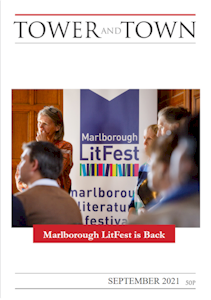

Tower and Town, September 2021 (view the full edition) (view the full edition)Orchard by Benedict Macdonald and Nicholas GatesWinners of the Richard Jefferies Prize for Nature Writing To win one Richard Jefferies Prize for Nature Writing (sponsored by the White Horse Bookshop) may be regarded as good fortune, to win two looks like being a writer who delivers the goods. Benedict MacDonald won the prize last year for Rebirding. This year, from an exceptionally strong shortlist, he and fellow author (and photographer) Nicholas Gates have done it again, with Orchard. The traditional orchard is a fertile habitat for an abundance of wildlife, but intensive farming practices mean that there are alarmingly few of them left. The book is the result of six years of visiting one family owned orchard 'somewhere in Hereford'. Originally intended as a photographic record of the biodiversity of the site, it developed into an immensely detailed and engaging book. Covering the history of orchards as 'fruit gardens' and the origin of most of our cultivated species (in the foothills of Kazakhstan; the name of the former capital, Almaty, translates as 'Father of Apples'), it also charts the alarming decline in numbers of British orchards, ruthlessly cut down and dug out with the aid of grant money during the 1970s and 80s. MacDonald and Gates write alternate chapters, describing month-by-month and in great detail the bird and insect life, plants, fungi and parasites which live, migrate and thrive in an established, chemical free environment. Lack of spraying and rigorous pruning for example encourages flocks of resident and migratory birds onto the site, where they eat harmful insects, which would otherwise threaten the crop and ultimately the trees themselves. With careful management our ancient orchards can remain productive. The decline in orchards - actually, it's gone beyond declining to 'almost extinct' - receives less publicity and discussion than threatened peat bogs or meadowland, but they are no less important. Politics and the pandemic are forcing us to look at food production and distribution, climate change is showing us that intensive farming methods may ultimately be fruitless (pun intended). However, despite the urgency of the message, this book is not a polemic, but an absorbing and readable account of a small, beautiful and timeless part of an agricultural heritage, where collaboration between humans and the natural world continues to be mutually beneficial. Debby Guest |